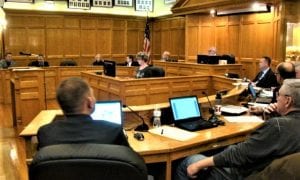WESTFIELD Members of two City Council committees worked Tuesday night to complete a draft of the rules by which the council conducts its business, a process that will be continued on Monday, Jan. 23 when the two committees meet to review the changes made last night to the document.
Members of the Legislative & Ordinance Committee and the Ad Hoc Committee on Charter and Rules conducted a four-hour marathon session to hammer out compromises which will be brought to the full council. Initially the committee though the revised rules package would be brought out Thursday night, but the scope of changes is so large that the committees will delay that action until the Feb 2 council session.
“There are a ton of changes,” L&O Chairman James E. Brown Jr. “We decided to wait to get the clean version, to review it on Jan. 23 to make sure all of the changes we made were incorporated and are correct, then distribute that corrected version to all of the council members so that they have a week to review it before its brought onto the floor for debate.”
Brown and Mary O’Connell, chairwoman of the Ad Hoc Committee on Charter and Rules, will report the status of the rules amendment change process Thursday instead of bringing the ordinance out of their respective committees.
The Council Rules is an ordinance which establishes the structure of the legislative branch of municipal government and establishes specific authority for the council president and the 10 standing council committees. The proposed documents has 41 sections and is the first update of the rules since 1970.
The members working on the draft Tuesday night expressed some fundamental differences in philosophy, attempting to separate substance from procedure. The Ad Hoc members supported two definitions of a majority, one for substantive votes, such as ordinance amendments, and a second definition of a majority present in chambers for a less rigorous standard for parliamentary procedure votes.
The L&O members opposed the less rigorous parliamentary standard.
The draft document defines the majority as the majority of the 13 member council, meaning seven members comprise a majority, even when one or more councilors are not present. That language shifts the balance of power to the minority members of the council because if only 10 members were present for a vote, four members, not seven, could defeat the issue.
“I’m not a fan of two majorities,” Brown, the Ward 2 councilor, said. “That’s politics. Seven votes is what it takes and it should be for everything. We should get the majority of the council, seven members, throughout the entire document.”
The two committees were divided on that issue, with the L&O voting 3-1 to keep one majority definition, while the Ad Hoc members voted 2-0 for the two-definition of a majority vote.
The two committees also discussed transparency of the council’s conduct of business. Resident Alvin See opened that discussion during public participation when he objected to the council practice of substantially changing an ordinance, order or motion between the first and second reading of that issue. “One thing I’ve noticed is that ordinances require two readings (at two separate council sessions),” he said. “If there is an amendment (in committee), it’s carried over to the next meeting without opportunity for public review. I recommend that you can’t amend at the second reading.”
The draft also changes the council’s policy on public participation. Traditionally members of the public were not allowed to speak on an issue on that agenda of that session.
The revised rules will allow public comment on agenda items with two exceptions. One exception is an issue that was the focus of a public hearing at a previous council session, while the second exception is if the issue will be discussed in a public hearing at that session.
“This is a huge change,” O’Connell said.
O’Connell also argued, unsuccessfully, that the council agenda should be posted with all supporting documents. “It’s transparency in its truest form,” she said.
Sue Phillips of the Law Department advised caution it adopting that language, citing the need for confidentiality in some council matters, such as executive session and personnel issues.



